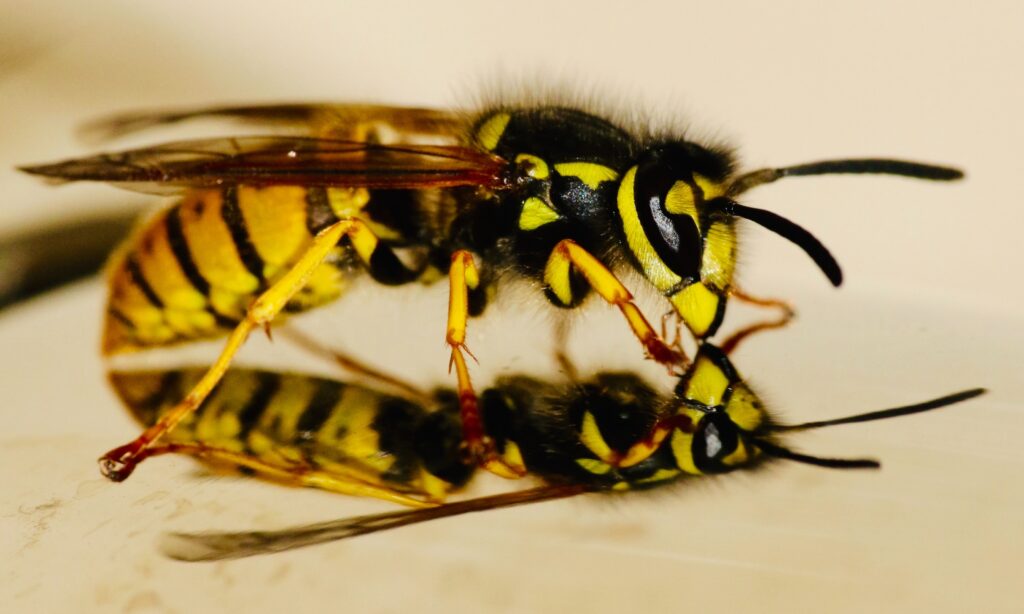If you’ve read our previous blog on Asian hornets, you might think we’re repeating ourselves this month. Read on. Wasps may also be black and yellow flying insects, but they are very different creatures to Asian hornets.

You won’t appreciate wasps much if they’ve ruined a picnic for you during the recent good weather, but wasps are part of the ecosystem. Like every other flying insect, wasps have an important role in pollinating plants, they eat greenfly and caterpillars and they are snacks for birds. Life without wasps would be life with fewer birds and more garden pests.
Appearance
At this point you’ll be saying “Black and yellow, wings and a sting” but there are over 110,000 species of wasp and all are different. Some are tiny, most are solitary and around two thirds of species don’t have a sting. Let’s face it, it’s the wasps that sting that draw human attention.
The wasps we get called out to deal with have slender black and yellow bodies with delicate wings and a vicious sting at the point of their lower body. Honey-bees are also slender-bodied, mainly black with some yellow and delicate wings; they are often mistaken for wasps, especially as they are active at the same time (during late spring and summer). So don’t swat a wasp in case it isn’t a wasp.

If you see a wasp…
Don’t disturb them. If you attack a wasp, it emits a pheromone that alerts others in its colony to come to help. Swat a wasp and you may find you have four or five wasps to deal with.
When a wasp flies in to investigate your outdoor feast, cover up any sweet things such as fruit, jam or drinks and move away calmly until they get bored. Check your food and drink before tucking in – a wasp may be hiding there.
They may land on you. Remember, wasps aren’t vicious unless they feel the need to defend themselves. Stay calm and let it fly away.
Stung by a wasp?
The best way to deal with a wasp sting is to:
- Wash the stung area gently with soap and water
- Pull out any stings with tweezers
- Put a cold flannel or cold wet towel on the area for ten minutes
- Rest for a while, and keep the stung area elevated
- Apply anti-histamine cream to the sting (may be labelled as “Bite and Sting Cream”)
The site of the sting will be red and sore for a few days, but it should subside. If you get flu-like symptoms, fever, pus seeping from the sting site or increased redness or soreness, call 111 or your GP for advice. Be especially vigilant if you were stung several times or in the face or neck.
Don’t be too alarmed by this next part, but I do have to warn you. A few people have a severe reaction to wasp or bee stings, sometimes after years of being stung before without suffering any serious effects. Be aware of the following symptoms:
- Feeling dizzy or faint
- Swollen face or tongue
- Difficulty in breathing – a restricted throat or wheezing breath
- Pale, clammy skin or feeling suddenly cold or very tired
If you notice any of these symptoms just after a wasp or bee sting, get medical help immediately. If someone becomes faint or is struggling to breathe after a wasp sting, call 999 and ask for an ambulance – tell the operator that you suspect anaphylactic shock. In extreme cases, anaphylaxis can be fatal. Quick action is vital.
Out, Out, Damn Wasp
Individual wasps in the home can be removed with a well-aimed squirt of fly and wasp killer spray, but if you have a wasp nest, you’ll need to call for reinforcements. Wasp nests can be beautiful papery spheres built into rafters in outbuildings or lofts or honeycomb structures in holes in the ground. If you see a lot of wasps, look for the nest (don’t disturb it!).
Obviously, commercial premises such as cafes, pubs or B&Bs will be less tolerant to wasps – customers don’t appreciate sharing their cream tea with a wasp. Again, if you can locate the nest, you can give us a head start on clearing the air for you.
Wasps are just starting to emerge from hibernation now and may not be a problem just yet. As summer builds up, wasps become more numerous and more active – and as fruit ripens in autumn, wasps arrive in greater numbers to feast on fermenting fruit. And yes, they do act like drunks leaving a night-club – erratic and ready to fight!
Call Us
If your wasp neighbours are causing you problems, give us a call. We know how to evict them and restore peace and order quickly and safely.

